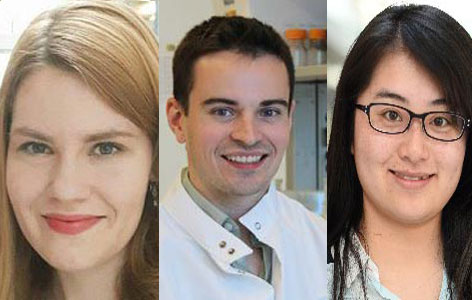
The Vanier Canada Graduate Scholarship program is a prestigious fellowship launched by the Government of Canada in 2008. Distributed annually, this award is designed to help Canadian academic and health care institutions attract the brightest and most outstanding doctoral students. The award recipients, referred to as Vanier Scholars, demonstrate outstanding leadership skills, an exemplary academic record and showcase high research excellence. As recipients, the award winners receive $50,000 annually over the span of three years. This year, the Office of Research Trainees (ORT) is pleased to announce that PhD candidates Marta Overchuk, Jenny Lou and Neal Callaghan are recipients this award. Highlighted below is a description of their research.
Marta Overchuk, supervised by Dr. Gang Zheng, Senior Scientist at Princess Margaret Cancer Care Center, is working on a research project entitled “Targeted Photodynamic Pre-Treatment for Enhanced Nanoparticle Delivery”. She aims to develop a strategy to enhance the delivery of drug-carrying nanoparticles to solid tumours, which will lead to improved therapeutic outcomes.
Jenny Lou, also supervised by Dr. Gang Zheng, is working on a project entitled, “Porphysome Mediated Enhancement of Adoptive Cell Therapy”. Jenny aims to improve a novel treatment option, called adoptive cell therapy (ACT), in which immune cells are isolated from a patient, multiplied, and re-injected to destroy tumour cells, for the treatment of lung cancer.
Neal Callaghan, co -supervised by Professors Craig Simmons and Paul Santerre at the Ted Rogers Centre for Heart Research within the Toronto General Research Institute, is working on a project entitled “Development of a chemically defined synthetic culture substrate for the maturation of human induced pluripotent stem cell-derived cardiomyocytes”. Induced pluripotent stem cells (iPSCs) are used in tissue engineering for drug screens and implantation in patients. Normally, iPSC-derived cardiomyocytes resemble fetal cells and cannot be brought to an adult level of maturity with current techniques. Hence, Neal’s research aims to develop chemically synthesized cell culture materials that can drive these cells to higher level of maturity.
Congratulations once again to all three winners!




